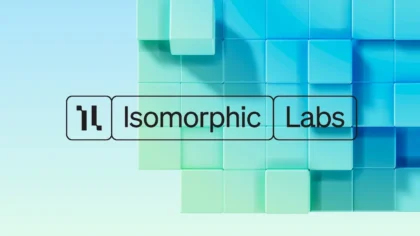Artificial Intelligence (AI) is revolutionizing entire industries, and Isomorphic Labs, a subsidiary of Alphabet, aims to be a leading name in reshaping the healthcare landscape. With a billion-dollar investment and strategic partnerships, the company is betting on AI-powered drugs to speed up drug development and enhance treatment effectiveness. Furthermore, its approach signals a long-term transformation in the biomedical sector.
What Is Isomorphic Labs?
Founded in 2021 by Demis Hassabis, co-founder of DeepMind, Isomorphic Labs focuses on using AI algorithms to discover new drugs. The company leverages molecular and genetic structure data to accelerate every stage of pharmaceutical research. In doing so, it seeks to optimize processes that would traditionally take years to complete.
What sets the company apart is its use of AlphaFold, an AI system capable of predicting how proteins fold in three dimensions. This breakthrough, developed by DeepMind, solved a decades-old scientific puzzle that hindered advances in molecular biology. As a result, it unlocked new possibilities for rational drug design.
Nobel Recognition
The impact of AlphaFold was so significant that in 2024, Demis Hassabis and researcher John Jumper were awarded the Nobel Prize in Chemistry for their work on the system. This recognition boosted the scientific credibility of the project and paved the way for its commercial applications—especially in the pharmaceutical industry. Therefore, the award validated not only the technology itself but also AI’s transformative potential in medicine.
A New Funding Round
In March 2025, Isomorphic Labs raised $600 million in its first external funding round, led by Thrive Capital. The round also included GV (Google Ventures) and Alphabet itself (Google’s parent company), further strengthening institutional support for the initiative.
Use of funds: The company plans to enhance its AI-based drug design engine and accelerate its programs toward clinical trials.
Strategic hires: According to Hassabis, while the company didn’t “urgently” need the money, the investment will help attract top scientists and researchers in the field. Thus, the funding is not just financial—it’s strategic.
How AI Speeds Up Drug Discovery
Protein structure prediction: AlphaFold forecasts how proteins fold and interact with molecules, making it easier to identify therapeutic targets.
Compound design: AI assists in creating and optimizing molecules that could become future drugs.
Massive data analysis: Using deep learning algorithms, Isomorphic Labs can process millions of chemical combinations faster, significantly shortening the research cycle.
Consequently, this method could reduce drug discovery timelines from years to just months. In addition, it cuts costs and allows for greater treatment personalization, making therapies more effective and accessible.
Major Partnerships and a Promising Pipeline
To accelerate outcomes, the company has formed partnerships with Eli Lilly and Novartis, which could generate up to $3 billion in milestone-based payments. These collaborations expand Isomorphic Labs’ reach in key areas like:
Oncology
Developing more effective and less invasive cancer treatments.
Rare Diseases
Researching conditions with few existing treatment options.
Autoimmune Disorders
Creating drugs that help balance the immune system.
In other words, the company is building a promising pipeline that could impact multiple fronts of modern medicine.
Clinical Trials on the Horizon
Isomorphic Labs has indicated that it plans to bring its first AI-powered drugs to clinical trials in 2025 or early 2026. If this timeline holds, it will mark a historic step in biotechnology. More than that, it will demonstrate how AI can drive breakthroughs at an unprecedented pace—something that once felt far off.
Ethical and Regulatory Challenges
Despite the excitement, using AI in healthcare requires caution and responsibility:
Data privacy: Safeguarding patients’ genetic and clinical data is critical.
Algorithm transparency: Regulators and researchers must understand how AI systems make decisions to ensure treatment safety.
Clinical accountability: Who is responsible if something goes wrong? It’s essential to define clear roles among AI teams, pharmaceutical companies, and regulatory bodies.
Therefore, monitoring ethical implications is just as vital as celebrating technological progress.
Conclusion
AI is no longer science fiction in medicine. With Isomorphic Labs, the idea of creating AI-powered drugs tailored to individual needs—and in record time—is becoming a reality. And if AlphaFold can already predict protein structures with high accuracy, it might soon offer a range of therapeutic solutions we’ve never seen before.
Ultimately, the world will be watching as these advancements unfold. If all goes as planned, Isomorphic Labs could dramatically shorten the distance between the lab and the hospital—ushering in a new era of AI-driven biomedical innovation.
Enjoyed this article?
Follow Sinapse Diária for more insights on the latest in technology, healthcare, and artificial intelligence.
Minecraft as an AI Testing Ground: A New Way to Measure Artificial Intelligence
AI Playing Pokemon on Twitch: Anthropic Revolutionizes the Game
Posts Recomendados
Carregando recomendações...



